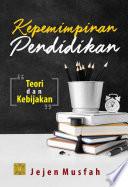Teori dan Kebijakan
Sebagai suatu organisasi, lembaga pendidikan memerlukan tidak hanya seorang manajer untuk mengelola sumber daya lembaga pendidikan yang lebih banyak berkonsentrasi pada permasalahan anggaran dan persoalan administratif lainnya, tetapi juga memerlukan pimpinan yang mampu menciptakan sebuah visi dan semua komponen individu yang terkait dengan lembaga pendidikan. Kepemimpinan pada hakikatnya merupakan kemampuan yang dimiliki seseorang untuk membina, membimbing, mengarahkan, dan menggerakkan orang lain agar dapat bekerja sama untuk mencapai tujuan yang telah ditetapkan. Untuk mewujudkan tujuan tersebut, pemimpin perlu melakukan serangkaian kegiatan, di antaranya mengarahkan orang-orang yang terlibat dalam organisasi yang dipimpinnya. Dengan kata lain tercapai atau tidak tujuan suatu organisasi sangat tergantung pada pimpinannya. Buku ini menyuguhkan teori, kebijakan, dan praktik kepemimpinan pendidikan di sekolah dan perguruan tinggi. Di dalamnya dibahas: konsep pemimpin, gaya kepemimpinan, model kepemimpinan, kepemimpinan perempuan, etika kepemimpinan, manajemen konflik, kompetensi kepala sekolah, kepemimpinan kepala sekolah, pembentukan budaya sekolah, pelatihan kepala sekolah, pemilihan rektor, dan isu-isu kepemimpinan pendidikan. Pemahaman yang baik tentang teori kepemimpinan dapat membantu praktisi pendidikan dalam menjalankan amanah kekuasaan sebagai pemimpin, sehingga mampu mengembangkan sekolah atau kampus yang unggul, inovatif, dan berdaya saing. Kepemimpinan Pendidikan: Teori dan Kebijakan disusun berdasarkan Rencana Pembelajaran Semester (RPS) mata kuliah Kepemimpinan Pendidikan, Prodi Manajemen/Administrasi Pendidikan, baik S-1, S-2, maupun S-3. Karenanya, buku ini sangat tepat menjadi rujukan utama bagi dosen dan mahasiswa Prodi Manajemen/Administrasi Pendidikan. Di samping itu, buku ini juga dapat dijadikan bacaan oleh pendiri dan pengurus yayasan, kepala sekolah, dan pimpinan perguruan tinggi. Sebagai suatu organisasi, lembaga pendidikan memerlukan tidak hanya seorang manajer untuk mengelola sumber daya lembaga pendidikan yang lebih banyak berkonsentrasi pada permasalahan anggaran dan persoalan administratif lainnya, tetapi juga memerlukan pimpinan yang mampu menciptakan sebuah visi dan semua komponen individu yang terkait dengan lembaga pendidikan. Kepemimpinan pada hakikatnya merupakan kemampuan yang dimiliki seseorang untuk membina, membimbing, mengarahkan, dan menggerakkan orang lain agar dapat bekerja sama untuk mencapai tujuan yang telah ditetapkan. Untuk mewujudkan tujuan tersebut, pemimpin perlu melakukan serangkaian kegiatan, di antaranya mengarahkan orang-orang yang terlibat dalam organisasi yang dipimpinnya. Dengan kata lain tercapai atau tidak tujuan suatu organisasi sangat tergantung pada pimpinannya. Buku ini menyuguhkan teori, kebijakan, dan praktik kepemimpinan pendidikan di sekolah dan perguruan tinggi. Di dalamnya dibahas: konsep pemimpin, gaya kepemimpinan, model kepemimpinan, kepemimpinan perempuan, etika kepemimpinan, manajemen konflik, kompetensi kepala sekolah, kepemimpinan kepala sekolah, pembentukan budaya sekolah, pelatihan kepala sekolah, pemilihan rektor, dan isu-isu kepemimpinan pendidikan. Pemahaman yang baik tentang teori kepemimpinan dapat membantu praktisi pendidikan dalam menjalankan amanah kekuasaan sebagai pemimpin, sehingga mampu mengembangkan sekolah atau kampus yang unggul, inovatif, dan berdaya saing. Kepemimpinan Pendidikan: Teori dan Kebijakan disusun berdasarkan Rencana Pembelajaran Semester (RPS) mata kuliah Kepemimpinan Pendidikan, Prodi Manajemen/Administrasi Pendidikan, baik S-1, S-2, maupun S-3. Karenanya, buku ini sangat tepat menjadi rujukan utama bagi dosen dan mahasiswa Prodi Manajemen/Administrasi Pendidikan. Di samping itu, buku ini juga dapat dijadikan bacaan oleh pendiri dan pengurus yayasan, kepala sekolah, dan pimpinan perguruan tinggi. Buku persembahan penerbit PrenadaMediaGroup #PrenadaMedia
Kepemimpinan Pendidikan: Teori dan Kebijakan disusun berdasarkan Rencana Pembelajaran Semester (RPS) mata kuliah Kepemimpinan Pendidikan, Prodi Manajemen/Administrasi Pendidikan, baik S-1, S-2, maupun S-3.







